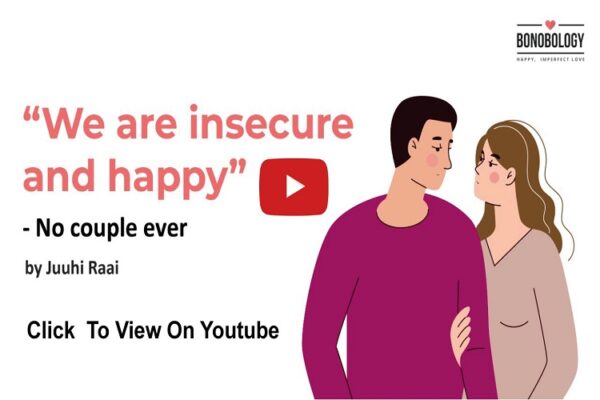What causes insecurity in a relationship? The question has weighed on most of our minds at some point. Either because we’ve found ourselves in the throes of insecure feelings or on account of having a partner who projected their insecurities on to the relationship. In both cases, insecurity has the potential to complicate relationships.
That’s why, much like jealousy, it is labelled as a negative emotion. However, not all insecurity is bad. It’s a natural human emotion that pushes us to protect what we hold dear. It is when the intensity of insecurity grows to an extent that it becomes the sole dominating force that trouble brews; a very insecure partner drains relationships.
Often, it’s hard to recognize when you’ve crossed the fine line between normal and toxic insecurity. To identify the difference, you first need to understand the root causes of insecurity. Today we have an expert to shed some light on the layered nature of insecurity. Psychologist Juhi Pandey (M.A, psychology), specializes in dating, premarital and breakup counseling; she’s here to answer your questions in depth, and give you some food for thought.
What Causes Insecurity In A Relationship – 8 Most Common Causes
Table of Contents
When looking for the root causes of insecurity, you often have to look within and introspect a little. That’s because this emotion is the direct result of unpleasant experiences that may have scarred you on some level.
Speaking of what causes insecurity in a relationship, Juhi says, “Feeling insecure is natural up to a point. It becomes a matter of concern when the person starts panicking and tendency starts to threaten the foundation of the relationship. There are a host of factors that can lead to insecurity in a relationship. These factors are seldom external. In most of cases, the reason lies within the person.”
An insecure partner drains the relationship to a large extent. To understand this further, let’s take a closer look at the 8 most common causes of insecurity in a relationship – they will help you answer the question, why am I so insecure with my partner?
1. Lack of confidence
According to Juhi, a lack of confidence or low self-esteem is one of the root causes of insecurity. These tendencies can make you feel – to a point of conviction – that others see no value in you because that’s how you view yourself. Owing to this, it becomes hard to believe that someone would value you as a romantic partner.
One of the classic examples of insecurity is the inability to believe your partner when they that they love you. You begin to take any expressions of love and affection with a pinch of salt, bracing yourself for the eventuality that your partner will walk out on you sooner or later.
When that happens, the slightest hint of trouble can send you spiraling out of control. Say your partner is upset with you. Rather than treat it for what it is – a fight, a disagreement, which is commonplace in relationships – you become paranoid that they’re done with you and are looking for a way out. Your personal insecurities can be the bane of your relationship.
Related Reading: Dealing With An Insecure Boyfriend? Here Are 15 Coping Tips
2. Traumatic experiences
Juhi explains, “Patterns of insecurity can also be seen in people who had traumatic experiences in the past. If a person has experienced the feeling of being unloved, ignored or cheated, they will project this emotional baggage in the form of insecure behavior.”
Consider this relationship insecurities example: If you have been in a toxic relationship with a narcissist who was overly critical of you or tried to put you down at every step of the way, the experience can leave you feeling extremely unsure of yourself. This form of emotional abuse can fill you up with a unshakable sense of fear, which becomes a trigger for your insecurities. It is quite unfortunate, but this is one of the most common insecurities prevalent.
If your past experiences continue to impact your life, you should seek therapy for insecurity in relationships. It is vital to understand that you may be self-sabotaging your relationship unknowingly. An insecure partner drains a relationship in an irreparable manner.

3. Extreme emotional dependence
Another one of the most frequent causes of insecurity is extreme emotional dependence. Let’s say you have suffered the loss of a loved one. Either in the event of death or on account of a relationship coming to an end. This loss has left such a void in your life that spending time alone fills you up with a sense of dread and anxiety.
As a result, you become insecure and start needing your partner to be by your side at all times. If they want or ask for space in the relationship, it triggers feelings of jealousy and possessiveness. In such cases, needy or clingy behavior become the patterns of insecurity.
One of the most common examples of insecurities in relationships is wanting time and attention even when your partner is unable to provide them. Throwing tantrums or creating scenes because you text went unanswered, flinging personal accusations because they couldn’t pick up a call, and other such behaviors are manifestations of your personal insecurities.
4. Trust issues are among the root causes of insecurity
What causes insecurity in a relationship? Trust issues are another common underlying cause. For instance, if a person has been cheated on by a long-term partner, such a betrayal of trust can make them riddled with insecurities. Of course, trusting a partner after an incident of infidelity is hard. But in such cases, often, the affected person struggles to build trust even in their subsequent relationships.

Juhi says that you don’t need to experience infidelity first hand for it to become of the root causes of insecurity. For instance, if as a child, you saw your family fall apart on account of one parent cheating on the other, this setback can trigger insecurity in your adult relationships.
If you or your partner are always suspicious of the other, keep tabs on the other’s moves, check their phones secretly, leading to big blowouts, consider it as one of the classic examples of insecurities in relationships. It is imperative that you resolve this underlying trigger – with professional help, if need be – to sustain any hope of making the bond last. Therapy for insecurity in relationships can be a very helpful in such a situation.
Related Reading: 10 Signs You are a Clingy Boyfriend
5. Childhood experiences
Juhi says, “Research shows that our adult behavior stems from what we experience as kids. If one is extremely insecure it can be traced back to one’s younger days or childhood experiences. The person might have suffered trauma at the hand of toxic parents. Or seen their parents experience some trauma such as divorce, which can become the basis of their insecurities in adult relationships.”
Apart from this, losing a house, a parent, a loved one or being exposed to financial instability during one’s formative years can also become a factor for an insecure personality. These issues are then projected on the partner or spouse, leading to conflicts and fights. The insecure partner drains relationships due to childhood trauma.
6. Body image issues are personal insecurities
Not being comfortable in one’s skin is also one of the most causes of insecurities. If you’re uncomfortable with your belly fat, for instance, you may have trouble being intimate with your partner. This lack of intimacy, especially if your SO doesn’t know or cannot understand the reason behind it, can drive you two apart.
Besides, when you don’t view yourself as desirable, you may tend to settle for partners who are less than worthy of you. Naturally, this leads to unsatisfying relationships where you’re continually compromising and lowering the bar of your standards. This, in turn, further fuels insecurity in a relationship. And you’re trapped in a vicious cycle that only aggravates patterns of insecurity.
Body image issues can stem from a host of reasons. But the most common is being criticized for your looks or appearances as a child or teenager. If you were teased or bullied at school for being too thin, too fat, too lanky, it’s natural that you grow up to be an adult who is extremely conscious of their looks.
The same pattern can also be unleashed if your parents always told you to watch your portions, eat less, exercise more, or not to wear certain clothes because they don’t ‘suit’ your body type. Overcoming this insecurity can be quite challenging as an adult.

7. Fear of failure
If you’re looking for examples of insecurity to understand the underlying causes, pay attention to a crippling fear of failure. Perhaps, you grew up in a family of overachievers and were always told that you need to do better ( and this is one of the most frequent relationship insecurities examples.) As a result, you begin to set unreasonably high standard for yourself and always push yourself too hard to attain them.
Failing to meet your goals is not an option for you. In the event that you do, every failure feels like a punch in the gut. It makes you relive the memories of your parents telling you that you’re not good enough. Pushing you to be more like your sibling or a friend can result in these most common insecurities.
Since failure in life is inevitable, your warped perception of it becomes one of the root causes of insecurity. Therapy for insecurity in relationships is important because partners with low self-esteem can damage the connection they share with a loved one.
8. Abuse can trigger patterns of insecurity
What causes insecurity in a relationship? The answer to this question would be incomplete without a mention of abuse. Suffering physical or emotional abuse, either as a child or in your past relationships can be a crushing experience.
It breaks your spirit and changes you at a fundamental level. These changes alter the way you view yourself, often leading to a dented self-esteem and no confidence in yourself. All of these factors augment your vulnerabilities, making you insecure not just in relationships but in every aspect of life.
From being sacred of social interactions to always worrying about others’ opinions of you and an inability to be yourself in relationships, abuse can take a serious toll on your life. An insecure partner drains the relationship without meaning to do so.
Types Of Insecurities In A Relationship
The patterns of insecurity often play on a wide spectrum. It’s hard to paint them with a single brush or compartmentalize them in one category. An overview of insecurity in a relationship will throw up one common denominating factor – problematic attachment styles.
These are characterized by a tendency to operate from a place of fear in relationships. However, if you look closely, even insecure attachments play out in different ways. In some cases, you see sense of reluctance, in others, extreme dependence. An ambivalent attachment style can be as harmful as an avoidant style.
Based on this, insecurities in a relationship can be categorized into three distinct types:
1. Disoriented insecurity
This is one of the types of insecurities in a relationship that stems from an experience of abuse in childhood. A person who displays disoriented insecurity is likely to have suffered emotional or physical abuse at the hands of their primary caregivers.
Perhaps, they were left alone, with their emotions needs unmet, during times of distress. As a result, internalized a sense of fear. Or maybe they were subjected to physical pain as a form of punishment and intimidation. Such children grow up to be adults who are disoriented and insecure partners that drain relationships.
They don’t know what to expect from people they love or those who love them. That’s because those who were supposed to give them their first lessons in love were affectionate in some moments and aggressive in other. Those affected by this type of insecurity struggle to maintain consistency in their relationships. They swing from submissive to aggressive, clingy to distant behavior patterns with unsettling ease.
2. Anxious insecurity
The second among the three types of insecurities in a relationship is characterized by a sense of anxiety. People affected by it struggle to establish intimate relationship, out of a fear of emotional pain. Such people are extremely independent. To the point of being aloof. Any hint of a person becoming too close or emotionally attached triggers a panic-riddled anxiety in them.
Typically, the root cause of this type of insecurity is an upbringing with emotional neglect. Such people are raised by emotionally distant or stunted caregivers, who are unable to support them when they most need it. As a result, they grow up believing that they’re on their own. The idea that someone else can support them or cater to their emotional needs is alien to them.
But is it normal to feel insecure in a new relationship, you ask? Yes absolutely. New-relationship anxiety is not to be confused with anxious insecurity. The latter is way more corrosive to a person’s wellbeing. An anxiously insecure partner drains the relationship intensely.

3. Ambivalent insecurity
The final among the three types of insecurities in a relationship is marked by intense contradictions. Like in most other patterns of insecurity, the root cause here too is childhood or early life experiences. People who grapple with this form of insecurity display extreme emotional dependency, a quest for approval, strong need for affection, and over-sensitivity to criticism or rejection.
When they get into relationship, they can’t shake off the fear that something will go wrong. As a result, they start focusing on the negatives and complete overlook the positives about their partners and relationships. This, then, becomes a trigger for anxiety, making them seek refuge in escapism.
Now that you understand what causes insecurity in a relationship, you can begin spotting any troublesome tendencies and getting to the root of the problem. If the reasons or causes of insecurity in a relationship are not apparent, there is a chance that the problem runs deeper. In that case, it’s best to seek professional help to become better equipped at handling them
Therapy for insecurity in relationships is highly beneficial. If you’re seeking for counselling to deal with patterns of insecurity but don’t know where to begin looking, our panel of licensed therapists is only a click away.
FAQs
Insecurity is an underlying emotional state that governs how we view ourselves and behave in relationships. Personal insecurities can play a large role in all spheres of our life; an insecure partner drains relationships as well.
There is no quick fix for this but you can start by getting to the root causes of insecurity. Then, take necessary steps to counter the tendencies or fears that make you feel insecure. Therapy for insecurity in relationships is a viable option too.
Working on improving your self-esteem and practicing self-love is a good place to start because insecurity is often triggered by internal factors rather than being influenced by external ones.
Invest in building trust, honest and open communication in your relationship to stop being jealous and insecure. With some work on yourself, you should be able to overcome your insecurities.
Ask Our Expert
You must be Logged in to ask a question.

